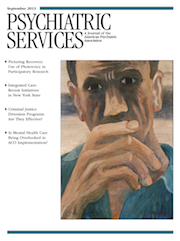To the Editor: In 2011, about one in six Americans was food insecure or lacking adequate financial access to food (
1,
2). Some studies suggest that rates of food insecurity are high in severely mentally ill populations (
3), but its prevalence has not been widely studied. We sought to determine this prevalence and its association with use of psychiatric emergency services.
We administered a cross-sectional survey to outpatients attending an urban community mental health clinic in the summer of 2011. Inclusion criteria were being age 18 years or older, an established clinic patient, and fluent in English. We excluded actively psychotic patients. We approached 146 (26%) of the 556 patients who attended the clinic. The Committee on Human Research of the University of California, San Francisco, approved the study.
The survey included demographic information and the ten-item Household Food Security Survey Module of the U.S. Department of Agriculture. We determined psychiatric emergency service utilization using the electronic medical record of the hospital that served more than 70% of this population. We obtained psychiatric diagnoses from the clinic’s electronic medical record.
We examined three levels of food security (food security, mild food insecurity, and severe food insecurity). We examined the association between food insecurity and psychiatric emergency service utilization with unadjusted linear regression models and adjusted logistic regression models.
A total of 111 (76%) of the 146 outpatients approached consented to participate. The mean±SD age of the 111 participants was 46.2±10.1 years; 27 (24%) were female, and 41 (37%) were white. Overall, 69 (62%) had a schizophrenia spectrum disorder, and 32 (29%) had a drug or alcohol use disorder. The prevalence of food insecurity was 71% (N=79); 27% (N=30) reported mild food insecurity and 44% (N=49) reported severe food insecurity.
Overall, 35 respondents (32%) had a psychiatric emergency room visit in the previous year. Participants with severe food insecurity had more mean visits in the past year than those who were food secure (1.73±2.60 versus .52±2.10; p=.01). The odds of any past-year psychiatric emergency room visits were five times higher among severely food-insecure participants than among those who were food secure after the analysis was adjusted for age, gender, race-ethnicity, and housing status (odds ratio=5.06, 95% confidence interval=1.43–17.9, p<.05)
We found a 71% prevalence of food insecurity and a 44% prevalence of severe food insecurity in our sample of patients with severe mental illness. These rates are substantially higher than those observed in other populations. For example, in the United States, the prevalence of food insecurity is 14.9% and the prevalence of severe food insecurity is 5.7% (
1). In a chronically ill but not psychiatrically ill population served within the same safety net, the prevalence of food insecurity was found to be 50%, with a 20% prevalence of severe food insecurity (
4,
5).
We noted a relationship between food insecurity and use of psychiatric emergency services. Increased use of health services by food-insecure individuals has also been found in a national cohort of homeless individuals (
5). Studies are needed to determine whether food insecurity leads to decompensation or whether illness severity leads to food insecurity.
Despite the limited generalizability of the findings, they suggest that community mental health providers should screen patients for food insecurity.
Acknowledgments and disclosures
Dr. Mangurian was supported by grant 1K23MH093689 from the National Institute of Mental Health. She and Dr. Seligman were supported by grant UCSF CTSI KL2RR024130 from the National Center for Advancing Translational Sciences, National Institutes of Health. Ms. Sreshta was supported by the Arnold P. Gold Foundation’s summer student research fellowship. The content is solely the responsibility of the authors and does not necessarily represent the official views of the National Institutes of Health.
The authors report no competing interests.

